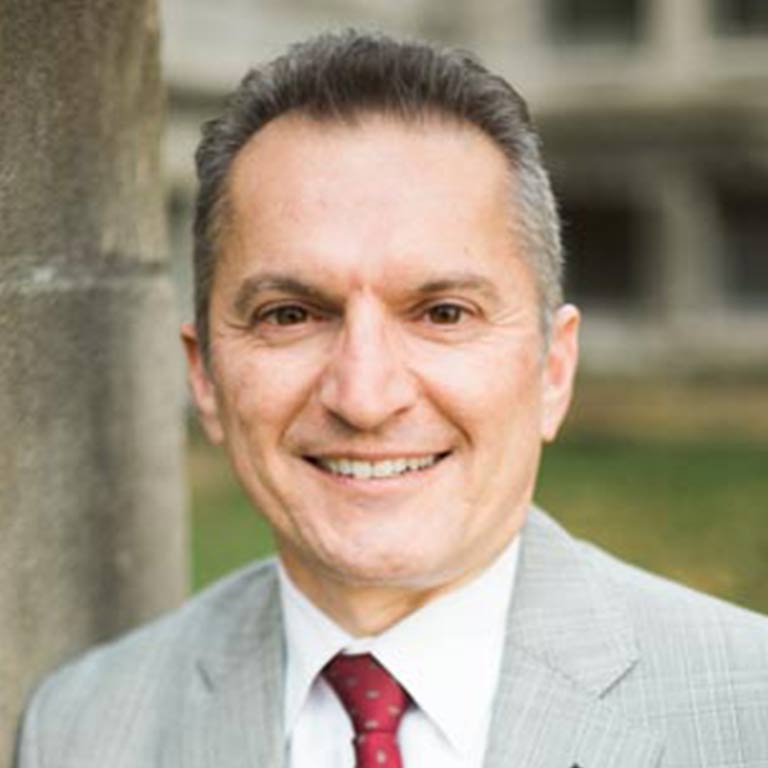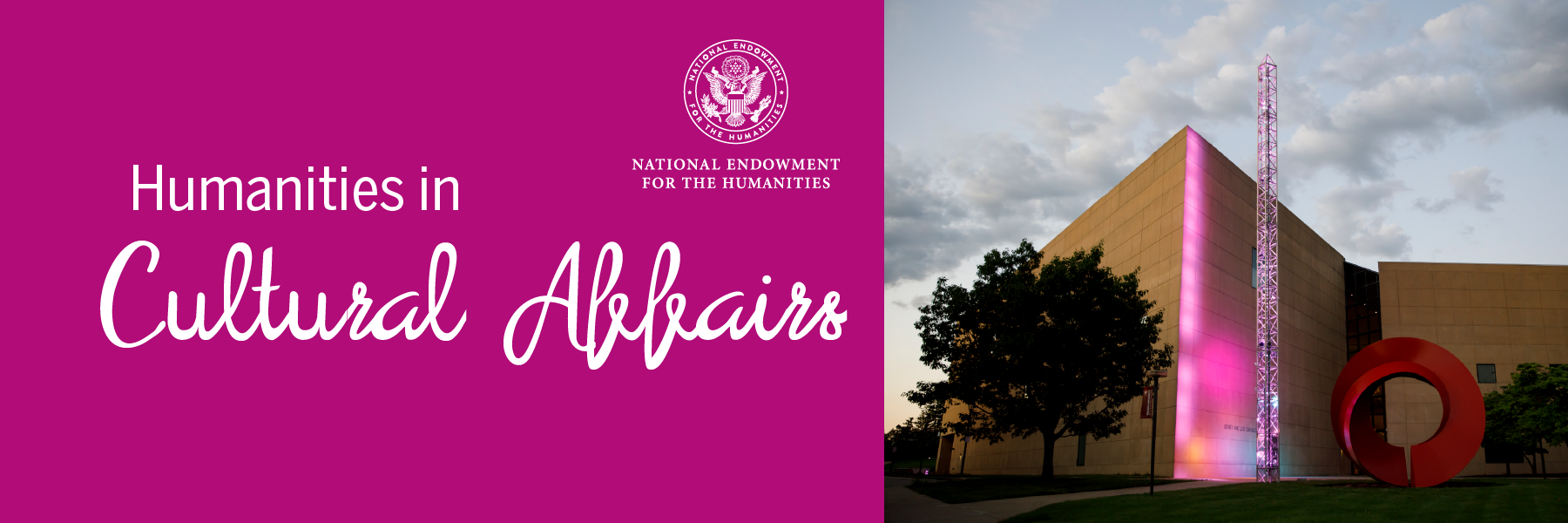November 3-4, 2023
Professor, Slavic and East European Languages and Cultures

The second Humanities in Cultural Affairs workshop, "Cultural Affairs in Translation," was co-chaired by Russell Valentino, Indiana University (IU) Professor in Slavic and East European Languages and Cultures.
The workshop brought together three professors outside of Indiana University: Esther Allen Professor of Latin American, Iberian, and Latino Cultures at Baruch College, Christopher Merrill director of the International Writing Program at University of Iowa, Sean Cotter Professor of Literature and Translation Studies at University of Texas at Dallas, and Rhi Johnson Assistant Professor of Spanish and Portuguese at Indiana University, along with several other IU humanities colleagues across multiple departments.
The participants gathered at the Lilly Library for an evening reception and pop-up display of IU humanities professors’ archival translation pieces on November 3, 2023. On Saturday, November 4, the workshop continued on campus from 10:00 a.m. to 3:00 p.m. at the O’Neill School of Public and Environmental Affairs for an academic discussion in a more intimate academic setting that went further in depth on translating topics in cultural affairs and hearing from those in the field.
Registration closed on November 1, 2023.
To learn more, visit our Humanities in Cultural Affairs series.
HICA Executive Summary
The translation archive in the Lilly Library was compiled over several decades of dedicated work by Breon Mitchell, the Library’s former director and a scholar and practitioner of literary translation. Through his extensive network of personal and professional connections, Mitchell was able to secure the papers of more than fifty translators of important literary works into English, including those of Edith Grossman, Michael Henry Heim, Bill Johnston, Susan Bernofsky, Esther Allen, William Weaver, Max Eastman, Willis Barnstone, and Barbara Wright. He was also able to secure the papers of important organizations in translation publishing and the non-profit arts world, including those of the American Literary Translators Association, The Antioch Review, Catbird Press, the Center for the Art of Translation, and Archipelago Books. Collectively, the archive represents an often overlooked but key component of English-language literature, where global literature intersects with US-based institutions at the levels of government funding, publishing, awards and prizes, reading groups, public libraries, universities, and more.
The archive poses questions central for all archives, including why one chooses to preserve these particular things (and not others), how best to use them once they have been collected, and how to make them not just accessible but also visible. Such questions always also exist within a changing and sometimes precarious institutional setting. Personnel change, and with them so do institutional commitments, funding, and values. What was of self-evident importance to stakeholders in, say, the 1970s, may look much less so to collectors today. By contrast, discovering new aspects of the past by means of the archived materials remains a magical possibility for anyone at any time.
Cultural Affairs in Translation: A Workshop
This complex and multi-layered history provided the context for “Cultural Affairs in Translation,” the second workshop in the series “Humanities in Cultural Affairs,” which was organized by the Center for Cultural Affairs in the O’Neill School of Public and Environmental Affairs at Indiana University Bloomington, with generous support from the National Endowment for the Humanities. The workshop, which was held on Saturday, November 4, 2023, was preceded by a reception and pop-up display from the Translators Archive at the Lilly Library, on Friday, November 3.
The workshop featured participation by Esther Allen, Professor of Latin American, Iberian, and Latino Cultures, Baruch College; Sean Cotter, Professor of Literature and Translation Studies, University of Texas at Dallas; Rhi Johnson, Assistant Professor of Spanish and Portuguese, Indiana University; and Christopher Merrill, Director of the International Writing Program at the University of Iowa. Approximately fifteen registered participants also took part, including the archive’s founder Breon Mitchell; IU Professor Bill Johnston, whose work is included in the archive; visiting scholar Zofia Ziemann, who was doing research in the archive in Fall 2023 with the help of a grant from the Kosciuszko Foundation; undergraduate students, graduate students, and additional faculty colleagues.
The pre-conference event helped to focus attention on the archive itself, especially through the displayed items in the pop-up exhibit, which included gems from the collections of Michael Henry Heim, Breon Mitchell, Esther Allen, Sean Cotter, Bill Johnston, and a sampling of the authors whose works they have translated, including Milan Kundera, Gunter Grass, Franz Kafka, Norman Manea, and José Manuel Prieto. The workshop discussions ranged widely across topics that included ownership, discovery, research and creativity, institutional precarity, authorship and originality, AI, labor, physicality, memory, and more. Participants agreed that the archive makes possible a unique focus on human interactions, and the networks of connections and relationships that bring artistic texts into being. Towards the end of our discussions, we turned out attention to questions of how to enhance archive’s visibility, and how best to improve access, all while keeping in mind the unique aspects of what a translators archive offers to potential users.
The Lilly translators archive is characterized most especially by what participant Bill Johnston referred to as “translators’ translators,” which means translators with a primary focus on literary translation, rather than individuals who did some translating “on the side” but whose main work was on something else, literary history, for instance, or their “own” poetry or fiction. A poet’s or novelist’s papers will often be featured in an archive on the basis of that author’s name, in much the same way that the publishing world markets contemporary literature on the basis of authorial image. Translation has historically been a much more hidden activity, and here too the archive plays an essential role in making visible what has tended to be ignored.
Using the Translators Archive
While we did not spend a lot of time on the topic, participants agreed that the archive can and should be used as a teaching resource, especially in the case of classes at IU Bloomington that are associated with the history and theory of translation. This is an opportunity of which several faculty at IU have availed themselves, and at least three graduate student participants in the workshop had recently visited the archive in the context of a class. Expanding on this usage would require additional digital infrastructure, on which see below.
The other major category of usage is research, and here the participants emphasized the importance of preserving the archive’s fundamentally humanistic character. Initially, the primary distinction here was to social sciences and STEM-focused approaches, but our discussion quickly turned to the contrast with digital technologies and AI. Here the archive’s multifaceted physical nature tends to lay bare the varied labor of translators, who sometimes become editors, designers, marketers, agents, advocates, and performers, in addition to serving as the writers of the words that give voice to non-English-writing authors. Participants agreed that it is hard to imagine a digital way to convey such a rich panoply. Our discussions, therefore, turned instead to how to enhance the entry into the archive itself.
Access and visibility, everyone agreed, needs to be highlighted as much as possible. The archive is impressive but remains at present a hidden gem inside the vast riches of the Lilly’s collections. Despite its extensive nature and the many exemplary artists whose work is included, many scholars—event scholars of translation—simply do not know about it. Some of this is likely to be remedied without additional attention, as translators and researchers learn about the collections, explore them more, and tell students and colleagues. But this discovery process can be enhanced.
Knowing the scope and breadth of holdings becomes key in this regard. The more specific and comprehensive the description of the sets of available materials, the better able a researcher or teacher will be to make use of them. Such detailed descriptions—the metadata associated with archival holdings—are somewhat uneven and could be expanded. Metadata compilation, moreover, is an ongoing project, as the archive grows and develops. Participants discussed the feasibility of appointing (and funding) graduate students with appropriate language and archiving skills to work on individual authors, essentially going through the materials and documenting what is contained in each component. For the archives of presses and other organizations, the graduate students would not necessarily need to have foreign language skills. IU has some internal funding that might be applied to such work (e.g., through the “Faculty Assistance for Data Science” program). There is also NEH funding in the category of preservation and access for which IU would be well placed to successfully apply.
Beyond the compilation and enhancement of metadata, the archive could benefit enormously from a general directory to its holdings. Participants agreed that a landing page specific to the archive is essential to counteract its currently “hidden” character. Links to such a page could be placed on other IU websites, for instance, in departments with likely student interest, where there are courses being taught that either focus on translated works, or highlight the activity or history of translation, and where there are faculty with research projects that make use of materials in the archive. Unlike the metadata work, this would be a one-time expense once designed.
Finally, the topic of the ongoing collection of materials for the archive came up more than once. With Mitchell’s retirement, the archive has tended to become less visible among the Lilly’s extensive collections and ongoing collection development. The envisioned landing page would help to highlight what has been done to date, but it would also signal to those living translators who might have only committed a portion of their papers that their work is still of interest and their papers well cared for. Instructions regarding whom to contact about sending more could be made clear on the page, again providing an easy reference point for dissemination and, potentially, an opportunity for those whose work is included in the archive to indicate how they would like their work to be used and where to send potential researchers who might be interested in discovering more.
Conclusion
Beyond the very practical and immediate aspects of our discussions, especially those associated with increased visibility and ease of access, the workshop discussions ranged widely across many topics, constantly reaching towards the more general territory of archival discovery, cultural values, and human-to-human interaction. As noted above, the contrast to AI and, more broadly, to digital resources became one of our focal points. It is difficult to overstate the power of hands-on archival work and the unexpected discoveries that open-ended exploration can facilitate. Participants agreed that the creation of digital resources, while especially helpful in terms of clarifying the details of what is available and encouraging their use, cannot substitute for the archive’s tactile dimension and the cumulative nature of experiencing things “all together.” Developing such digital resources, therefore, should not be conceived of as a substitute or replacement for these virtues of the archive, but instead as tools that encourage and enhance its use.
Russell Valentino, 19 March, 2024
Participants
Esther Allen, Professor, Latin American, Iberian, and Latino Cultures - Baruch College
Sean Cotter, Professor, Literature and Translation Studies - University of Texas at Dallas
Christopher Merrill, Director, International Writing Program - University of Iowa
Rhi Johnson, Assistant Professor, Spanish and Portuguese - Indiana University



